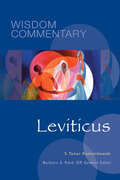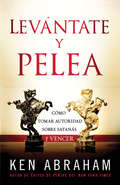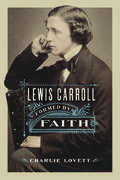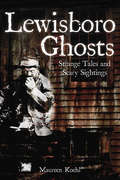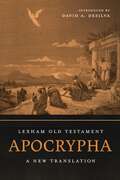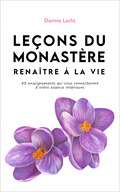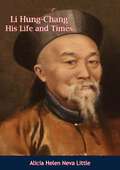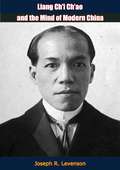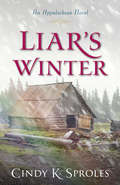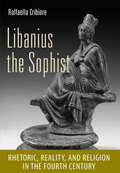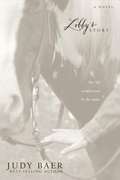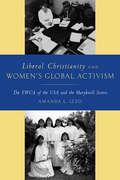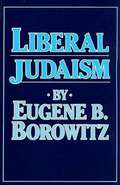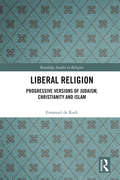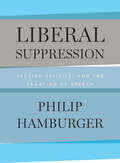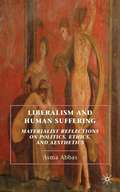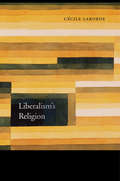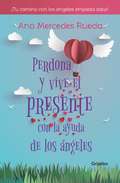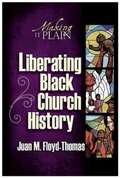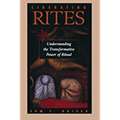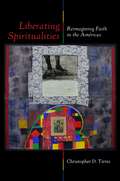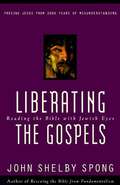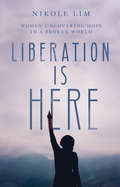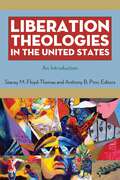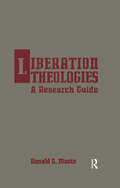- Table View
- List View
Leviticus: Wisdom Commentary, Volume 3
by S. Tamar Kamionkowski Lauress Wilkins Lawrence and Barbara E. ReidThe book of Leviticus provides two different theologies related to God’s presence within ancient Israel. Leviticus 1–16 was written by an elite caste of priests (P), and Leviticus 17–26 (H) was added to the book to “democratize” access to God. While the Priestly work has hardly inspired lay readers, the Holiness Writings provide some of the most inspiring and well-known verses from the Bible. <P><P> This volume shows how gender dynamics shift between the static worldview of P and the dynamic approach of H and that, ironically, as holiness expands from the priests to the people, from the temple to the land of Israel, gender behaviors become more highly regulated. This complicates associations between power and gender dynamics and opens the door to questions about the relationships between power, gender, and theological perspectives.
Levántate y Pelea: Cómo tomar autoridad sobre Satanás y vencer
by Ken AbrahamLas armas que usted necesita en la guerra contra Satanás A la mayoría de nosotros no nos gusta pelear con el diablo. Eso es inteligente. Solo un tonto buscaría enfrentarse a un ser sobrenatural demoniaco. Lamentablemente, ese intruso maligno ha venido buscándote. El no pelea justamente, ni tampoco espera una invitación. Levántate y pelea, te prepara para cada batalla. Presentado en un estilo dinámico y accesible, es el recurso perfecto para reconocer y enfrentar los ataques demoniacos, las maldiciones generacionales y las fortalezas que vienen contra ti, de modo que puedas: · Reconocer las huellas de Satanás en tu vida, · Identificar cómo el enemigo trata de minar tu relación con Dios · Proteger tu vida, tu familia y amigos de los ataques · Derrotar a Satanás con el poder del Espíritu Santo No tienes que soportar más las mentiras de Satanás. ¡En ti está el poder para levantarte y pelear!
Lewis Carroll: Formed by Faith
by Charlie LovettFor Lewis Carroll, a deacon in the Church of England, faith in Christ and belief in a loving God stood at the core of his being, but little has been written about what the church or faith meant to the celebrated author of the Alice books. With Lewis Carroll: Formed by Faith, Charlie Lovett provides the first in-depth study of the religious life of the famous author, whose real name was Charles Lutwidge Dodgson.By examining Dodgson’s religious education and core beliefs, this book shows how a deep Christian faith undergirded and guided every part of his life and work, from his relationships with children to his renowned writings, his work on logic, even his hobbies of photography and theatre going. The book includes a detailed account of the career of Dodgson’s father—an important figure in the Anglican church and a key influence on his son.Family records give insight into Charles’s early education, and newly discovered manuscript materials paint a full picture of his religious education at Richmond and Rugby Schools. Lovett finds previously unknown influences in Dodgson’s life, analyzes his habits of preaching and prayer, explores his training for confirmation and ordination, analyzes his reasons for eschewing the priesthood, and concludes with an account of his death and funeral and his logically constructed theology of the afterlife. The book makes use of previously untapped sources and highlights new material, including a previously unknown sermon by Dodgson, the first ever discovered. The result is a major contribution offering new perspectives on this creator of fantastical fiction and the spiritual bedrock that informed his life and imagination.
Lewisboro Ghosts: Strange Tales and Scary Sightings (Haunted America)
by Maureen KoehlOn the easternmost edge of Westchester County, among the quiet communities nestled against the Connecticut state line, memories of eerie incidents and haunted happenings flow through the generations like the currents of the nearby Hudson River. The old-timers of South Salem and Waccabuc still recall the legendary"Leather Man," an itinerant vagabond who rambled mysteriously through the region in the late 1800s. Over in Goldens Bridge they whisper of "the Christmas Soldier," an apparition of a Revolutionary-era Patriot who stalks the Highway 22 corridor. And beneath Long Pond Mountain the locals listen attentively for the "Wail of the Wind," the sorrowful moan attributed to two ghostly parents lamenting their son's drowning. Read Maureen Koehl's Lewisboro Ghosts to discover the spooky stories and supernatural sightings that linger in this tucked-away corner of the lower Hudson Valley.
Lexham Old Testament Apocrypha: A New Translation
by David A. DeSilvaA modern translation with introductions by David A. deSilva. The Lexham Old Testament Apocrypha includes: Tobit (Vaticanus and Sinaiticus) Judith Greek Esther (Greek) Wisdom of Solomon Wisdom of Sirach Baruch Letter of Jeremiah the additions to Daniel (Old Greek and Theodotion), including the Prayer of Azariah, Susanna, and Bel and the Dragon 1–4 Maccabees 1–2 Esdras the Prayer of Manasseh Psalm 151 Psalms of Solomon Greek 1 Enoch Beautifully typeset in a single-column format, the Lexham Old Testament Apocrypha provides a literal and contemporary translation for modern readers. David A. deSilva briefly introduces each book, providing context and insight. This volume includes works typically omitted from other editions of the Apocrypha, such as the Psalms of Solomon, the Greek text of Enoch, and multiple versions of Tobit and the additions to Daniel. The Apocrypha has been highly esteemed throughout history. While its canonical status is disputed, it has been embraced by Christians over centuries for personal study, devotion, and worship. The diverse writings in the Apocrypha contain biblical and post-biblical history, historical fiction, wisdom, and liturgy. These books shed light on Second Temple (intertestamental) Judaism and the New Testament, and they continue to inspire readers today.
Leçons du Monastère: Renaître à la vie - 33 enseignements qui vous connecteront à votre essence intérieure
by Davinia LachtDans Leçons du monastère, vous trouverez 33 enseignements clés pour réintégrer votre centre de tranquillité et vivre le quotidien dans la paix et l’harmonie. À travers des exemples pratiques et des expériences de l’auteure, vous découvrirez que la sphère spirituelle englobe tous les aspects de votre vie et que vous êtes prêt à vous ouvrir à la voie de l’amour, ici et maintenant. Guérissez vos relations, profitez du quotidien et laissez-vous guider par les voix du silence. Ces pages sont une invitation à découvrir votre rôle essentiel dans ce monde et à comprendre que la seule chose qui puisse vous faire ressentir la plénitude est justement de jouer ce rôle. La vie est simple et c’est votre droit de naissance d’être heureux, en honorant votre relation avec les autres et en vivant le moment présent de façon inconditionnelle. Découvrez la lumière qui est en vous. Êtes-vous prêt ? Ces enseignements proviennent du temps que Davinia Lacht a passé dans la communauté monastique de Taizé en France. Pendant plus d’un an, elle a concilié silence, service et vie communautaire en se détachant des voix intérieures qui ne parlaient pas d’amour. Bien que cet ouvrage soit né dans une communauté chrétienne, son message n’appartient à aucune religion ni à aucune tradition particulière et invite tout le monde à s’unir, au-delà des noms.
Li Hung-Chang: His Life and Times
by Alicia Helen Neva LittleAlicia Little (1845–1926) was a prolific writer who moved to China after her marriage to missionary Archibald Little (1838–1907) in 1866. She published many accounts of Chinese culture and society before founding the successful campaign against foot-binding in 1895. This volume, first published in 1903, contains her biography of the eminent Chinese statesman Li Hung–Chang (1823–1901). Li was a towering figure in late nineteenth century Chinese political life, exerting a profound influence over Chinese foreign policy and relations and overseeing China's development of western style industrialism until his dramatic fall from power following China's defeat in the 1894 Sino-Japanese War. Using contemporary newspaper accounts, eyewitness descriptions, and interviews with his contemporaries, Little describes Li's life chronologically, describing his rise to prominence following the Taiping Rebellion in 1851. This volume was the first extensive account of Li's life to be published in English.-Print ed.
Liang Ch’i Ch’ao and the Mind of Modern China
by Joseph R. LevensonThe distinction between “history” and “value” is the ground of this penetrating work. Liang Ch’i-ch’ao began writing in the 1890’s, as one who was straining against his tradition intellectually, seeing value elsewhere, but still emotionally tied to it, held by his history. How history contrived such a tension, how its release in Liang went together with the release of Confucian China from life, is the grand subject.And in drawing the times out of Liang’s intellectual life, Mr. Levenson contributes much of more general interest—a new understanding of the concepts of anachronism, analogy, contemporaneity, the generation, historical relativism, historical context, cultural and national identity, personal identity, and the distinction (crucial to comprehension of why ideas ever change) between “thinking” and “thought.”“A brilliant study of the life and work of an exceptional writer who shaped the political thought of modern China…Told with a humanist understanding far removed from the dry-as-dust manner usually ascribed to front-rank historians…this detailed account of a maker of modern China will interest not only the scholar in Far Eastern affairs, but will hold enthralled all students of the human mind in its never-ending quest for adjustment in a world of change.”—Asia Major“Why was the Confucian tradition found wanting? Why was westernization rejected? Why was Nationalism not enough for China? To these and many similar questions Liang’s life and writings provide the best answer. Mr. Levenson has interpreted them with real insight into the nature of Chinese civilization.”—Times Literary Supplement“Advances enough brilliant and challenging hypotheses to invigorate studies of Chinese intellectual history for a long time to come….[Levenson’s study] shows throughout a compassionate understanding of the harsh dilemmas, the bitter tragedies that the last century has brought to all Chinese.”—Arthur F. Wright
Liar's Winter: An Appalachian Novel
by Cindy K. SprolesLochiel Ogle was born with a red-wine birthmark--and it put her life in jeopardy from the moment she entered the world. Mountain folks called it "the mark of the devil," and for all the evil that has plagued her nineteen-year existence, Lochiel is ready to believe that is true. And the evil surely took control of the mind of the boy who stole her as an infant, bringing her home for his mother to raise.Abused and abandoned by the only people she knows as family, Lochiel is rescued by a peddler and given the first glimpse of love she has ever known. The truth of her past is gradually revealed as is the fact that she is still hunted by a brother driven to see her dead. Unsure if there's anyone she can truly trust, Lochiel is faced with a series of choices: Will she continue to run for escape or will she face her past and accept the heartbreaking secrets it reveals? Which will truly free her?Set in the wild and beautiful Appalachian Mountains of nineteenth-century East Tennessee, Liar's Winter is an unflinching yet inspirational exploration of prejudice and choice.
Libanius the Sophist: Rhetoric, Reality, and Religion in the Fourth Century
by Raffaella CribioreLibanius of Antioch was a rhetorician of rare skill and eloquence. So renowned was he in the fourth century that his school of rhetoric in Roman Syria became among the most prestigious in the Eastern Empire. In this book, Raffaella Cribiore draws on her unique knowledge of the entire body of Libanius’s vast literary output—including 64 orations, 1,544 letters, and exercises for his students—to offer the fullest intellectual portrait yet of this remarkable figure whom John Chrystostom called “the sophist of the city."Libanius (314–ca. 393) lived at a time when Christianity was celebrating its triumph but paganism tried to resist. Although himself a pagan, Libanius cultivated friendships within Antioch’s Christian community and taught leaders of the Church including Chrysostom and Basil of Caesarea. Cribiore calls him a “gray pagan” who did not share the fanaticism of the Emperor Julian. Cribiore considers the role that a major intellectual of Libanius’s caliber played in this religiously diverse society and culture. When he wrote a letter or delivered an oration, who was he addressing and what did he hope to accomplish? One thing that stands out in Libanius’s speeches is the startling amount of invective against his enemies. How common was character assassination of this sort? What was the subtext to these speeches and how would they have been received? Adapted from the Townsend Lectures that Cribiore delivered at Cornell University in 2010, this book brilliantly restores Libanius to his rightful place in the rich and culturally complex world of Late Antiquity.
Libby's Story
by Judy BaerA quiet, dark-haired beauty, tenderhearted, fiercely loyal, and single, Libby Morrison is consumed with caring for her aging parents. Handsome, sensitive, angry, and alone, Reese Reynolds is immersed in sell-pity from a gunshot that has left him paralyzed. A chance encounter begins their unlikely and unpredictable story. Along the way, Libby's childhood friends, Jenny and Tia, help her learn that true love overcomes enormous obstacles.
Liberal Christianity and Women's Global Activism: The YWCA of the USA and the Maryknoll Sisters
by Amanda IzzoReligiously influenced social movements tend to be characterized as products of the conservative turn in Protestant and Catholic life in the latter part of the twentieth century, with women's mobilizations centering on defense of the “traditional” family. In Liberal Christianity and Women’s Global Activism, Amanda L. Izzo argues that, contrary to this view, liberal wings of Christian churches have remained an instrumental presence in U.S. and transnational politics. Women have been at the forefront of such efforts. Focusing on the histories of two highly influential groups, the Young Women’s Christian Association of the USA, an interdenominational Protestant organization, and the Maryknoll Sisters, a Roman Catholic religious order, Izzo offers new perspectives on the contributions of these women to transnational social movements, women’s history, and religious studies, as she traces the connections between turn-of-the-century Christian women’s reform culture and liberal and left-wing religious social movements of the 1960s and 1970s. Izzo suggests that shared ethical, theological, and institutional underpinnings can transcend denominational divides, and that strategies for social change often associated with secular feminism have ties to spiritually inspired social movements.
Liberal Judaism
by Eugene B. BorowitzAn acute and precise insight into history of the Jewish people from an early Semitic tribe to its place today as a force in America and throughout the world.
Liberal Religion: Progressive versions of Judaism, Christianity and Islam (Routledge Studies in Religion)
by Emanuel de KadtIn recent years, there has been an upsurge of interest in religion and religious issues. Some have linked this to a neo-liberal form of individualism, while others noted that secularism has left people bereft of a humanly necessary link with the transcendent. The importance of identity issues has also been remarked upon. This book examines how liberal forms of religion are allowing people to engage with religion on their own terms, while also feeling part of something more universal. Looking at liberal approaches to the Abrahamic faiths – Judaism, Protestant and Roman Catholic Christianity and Islam – this book teases out how postmodern culture has shaped the way in which people engage with these religions. It also compares and contrasts how liberal thinking and theology have been expressed in each of the faiths examined, as well as the reactionary responses to its emergence. By considering how liberalism has influenced the narrative around the Abrahamic faiths, this book demonstrates how malleable faith and spirituality can be. As such, it will be of interest to scholars working in Religious Studies, Theology, Sociology and Cultural Anthropology.
Liberal Suppression: Section 501(c)(3) and the Taxation of Speech
by Philip HamburgerIn the course of exempting religious, educational, and charitable organizations from federal income tax, section 501(c)(3) of the Internal Revenue Code requires them to refrain from campaign speech and much speech to influence legislation. These speech restrictions have seemed merely technical adjustments, which prevent the political use of a tax subsidy. But the cultural and legal realities are more disturbing. Tracing the history of American liberalism, including theological liberalism and its expression in nativism, Hamburger shows the centrality of turbulent popular anxieties about the Catholic Church and other potentially orthodox institutions. He argues persuasively that such theopolitical fears about the political speech of churches and related organizations underlay the adoption, in 1934 and 1954, of section 501(c)(3)’s speech limits. He thereby shows that the speech restrictions have been part of a broad majority assault on minority rights and that they are grossly unconstitutional. Along the way, Hamburger explores the role of the Ku Klux Klan and other nativist organizations, the development of American theology, and the cultural foundations of liberal “democratic” political theory. He also traces important legal developments such as the specialization of speech rights and the use of law to homogenize beliefs. Ultimately, he examines a wide range of contemporary speech restrictions and the growing shallowness of public life in America. His account is an unflinching look at the complex history of American liberalism and at the implications for speech, the diversity of belief, and the nation’s future.
Liberalism and Human Suffering
by Asma AbbasThis book investigates the sources and implications of our encounters with suffering in contemporary politics and culture, exploring the forces that determine how suffering matters. It counters liberalism's distorting domestications of human suffering, which are most acute in its politics of redress through justice, the law, representation and inclusion. Radically rethinking the subjectivity of sufferers and arguing that our experience of the world is not prior to or outside of justice, but constitutive of it, the book recuperates a materialist politics that emphasizes sensuous activity, reclaims representation, and honors "the labor of suffering. ""
Liberalism’s Religion
by Cécile LabordeCécile Laborde argues that religion is more than a statement of belief or a moral code. It refers to comprehensive ways of life, theories of justice, modes of association, and vulnerable collective identities. By disaggregating these dimensions, she addresses questions about whether Western secularism and religion can be applied more universally.
Liberate del pasado y vive el presente
by Ana Mercedes Rueda Zapata¿Qué podemos aprender de los ángeles para liberarnos del pasado y vivir el presente? Este libro contiene todas las respuestas y las claves que le permitirán al lector perdonar y atraer a su presente lo que siempre ha soñado. ¿Cómo podemos vivir en el presente? y ¿cómo pueden ayudar los ángeles en este proceso? Estos son algunos de los cuestionamientos que la autora resuelve en este libro. Además, explica los principales obstáculos que le impiden a una persona soltar el pasado y perdonar a quienes le han hecho daño, así como los pasos a seguir para alcanzar una sanación emocional y espiritual.
Liberating Black Church History: Making It Plain
by Juan M. Floyd-ThomasNo serious scholar in biblical studies today can introduce students to his or her field without taking into account the contributions of African American scholarship. The long traditions of biblical interpretation in the Black Church, and the innovative research and writing performed by African American scholars in recent years are now essential components of a critical study of the Bible.Up to now, knowing how best to introduce the fruits of African American biblical scholarship to students has been difficult. Good resources exist, yet too often they are not written with the needs of introductory students in mind. This book meets that need by providing an overview of the most important developments in African American approaches to biblical scholarship. It offers insight into the particular ways that African American scholarship has shaped the world of biblical study.
Liberating Rites: Understanding the Transformative Power of Ritual
by Tom F. DriverIn Liberating Rites: Understanding the Transformative Power of Ritual, Tom F. Driver illuminates the making of ritual by removing it from its churchly wrappings and presenting it as something raw, basic, and central to all living beings. He examines the varied ways humans use ritual to give order to their lives, to deepen feelings of communal belonging, and to transform the status quo. Driver looks closely at how ritual, viewed as creative performance, is essential to religion and to the movement from bondage to freedom, whether in society or the individual. His analyses use examples drawn from a wide variety of cultures and religions -- Haiti, Korea, South Africa, Judaism, Roman Catholicism, Hinduism, and more, in addition to the author's own North American Protestantism. The result is an accessible and engaging discussion, ideal for introductions to religion, the psychology of religion, the sociology of religion, and studies in ritual and liturgy. Many general readers also will find the book fascinating because it makes explicit so many unspoken feelings about the human longing for rituals that 'work,' combining meaning with power.
Liberating Spiritualities: Reimagining Faith in the Américas
by Christopher D. TirresA new perspective on spirituality and social change as seen through the work of six visionary thinkersIn Liberating Spiritualities, Christopher D. Tirres offers an in-depth exploration of spirituality as a catalyst for social transformation, showcasing the profound insights of six distinguished twentieth-century liberation thinkers from across the Américas. This thought-provoking work examines the contributions of Marxist philosopher José Carlos Mariátegui, renowned educator and philosopher Paulo Freire, innovative constructive theologian Virgilio Elizondo, influential cultural and feminist theorist Gloria Anzaldúa, activist mujerista theologian and social ethicist Ada María Isasi-Díaz, and groundbreaking ecofeminist theologian Ivone Gebara. Tirres examines the distinct yet interconnected philosophies of these figures, showcasing their unified critique of colonial Christendom and their deep commitment to the marginalized. He adeptly articulates how their diverse religious and philosophical backgrounds come together in a shared vision of spirituality as a fundamental aspect of human life and intelligence. He further illuminates how these thinkers advocate for spirituality as a non-reductive, life-affirming practice, transcending traditional boundaries and offering an integrated approach to faith, culture, and social justice. Their collective insights form a persuasive case for re-envisioning spirituality as a crucial element in the quest for a more just and compassionate world.Liberating Spiritualities is not only a tribute to these six influential figures but also a critical reflection on the relevance of their ideas in today’s global context. Tirres’s transdisciplinary study bridges liberationist and pragmatic insights, offering readers a fresh, highly original interpretation of socially engaged spirituality, making this book an essential resource for those seeking to understand the transformative power of spirituality in the pursuit of social justice and human dignity.
Liberating the Gospels: Reading the Bible with Jewish Eyes
by John Shelby SpongIn this boldest book since Rescuing the Bible from Fundamentalism, Bishop John Shelby Spong offers a compelling view of the Gospels as thoroughly Jewish texts. Spong powerfully argues that many of the key Gospel accounts of events in the life of Jesus--from the stories of his birth to his physical resurrection--are not literally true. He offers convincing evidence that the Gospels are a collection of Jewish midrashic stories written to convey the significance of Jesus. This remarkable discovery brings us closer to how Jesus was really understood in his day and should be in ours.
Liberation Is Here: Women Uncovering Hope in a Broken World
by Nikole LimAs a freelance filmmaker, Nikole Lim's career allowed her to step in and out of the lives of marginalized people around the world. But when confronted with the prevalence of sexual violence in Kenyan and Zambian communities, she commits to advocating alongside the courageous survivors whose lives have intersected with hers. These women's powerful stories inspire her to embark on a new vocation, partnering with survivors of sexual violence to launch a nonprofit organization that equips women to lead through the rewritten stories of their lives. But as Lim seeks to help her friends experience healing and liberation, her perspective is altered. Spiritually depleted, she finds herself ministered to by the women she came to serve—the once oppressed become her liberators. Illustrated with dramatic full-color photography from Lim's own camera, Liberation Is Here transports us to forgotten corners of the world. From the slums of Nairobi, hospitals of Lusaka, killing fields of Kigali, and the back alleys of Barcelona, Lim weaves together a narrative of God’s grace and healing amid fear and trauma. Her journey proves that liberation is not just near, but it is here—in the eyes of the broken, the hearts of the oppressed, and the untold stories of our global community.
Liberation Theologies in the United States: An Introduction
by Stacey M Floyd-Thomas Anthony B PinnLiberation Theologies in the United States reveals how the critical use of religion can be utilized to challenge and combat oppression in America. In the nascent United States, religion often functioned as a justifier of oppression. Yet while religious discourse buttressed such oppressive activities as slavery and the destruction of native populations, oppressed communities have also made use of religion to critique and challenge this abuse. As Liberation Theologies in the United States demonstrates, this critical use of religion has often taken the form of liberation theologies, which use primarily Christian principles to address questions of social justice, including racism, poverty, and other types of oppression. Stacey M. Floyd-Thomas and Anthony B. Pinn have brought together a stellar group of liberation theology scholars to provide a synthetic introduction to the historical development, context, theory, and goals of a range of U.S.-born liberation theologies: Black Theology—Anthony B. Pinn Womanist Theology—Stacey M. Floyd-Thomas Latina Theology—Nancy Pineda-Madrid Hispanic/Latino(a) Theology—Benjamín Valentín Asian American Theology—Andrew Sung Park Asian American Feminist Theology—Grace Ji-Sun Kim Native Feminist Theology—Andrea Smith Native American Theology—George (Tink) Tinker Gay and Lesbian Theology—Robert E. Shore-Goss Feminist Theology—Mary McClintock Fulkerson &“An extraordinary resource for understanding the vitality of liberation theologies and their relation to social transformation in the changing U.S. context. Written in an accessible and engaged way, this powerful and informative text will inspire beginners and scholars alike. I highly recommend it."—Kwok Pui-lan, author of Postcolonial Imagination and Feminist Theology &“A delight to read . . . [and] an exemplary account of the genre of liberation theologies." ―Religious Studies Review
Liberation Theologies: A Research Guide
by Ronald G. MustoFirst Published in 1991. The following is a comprehensive scholarly bibliography of published materials on the varieties of liberation theology, mostly in book form, available in English. It is intended as an introductory survey to this vast and quickly expanding field for the teacher and student of contemporary theology, of biblical hermeneutics, and to the interrelationship of politics and religion around the world. It will also serve as a comprehensive bibliography.
